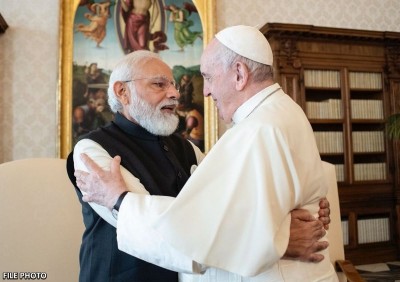Think critically, adapt to unforeseen circumstances, leverage latest technology to gain strategic advantage, says Rajnath Singh to military leaders
Indian Defence Minister Rajnath Singh has called upon the military leaders to think critically, adapt to unforeseen circumstances and leverage latest technological advancements to gain a strategic advantage in today’s ever-evolving geopolitical landscape.
Addressing the MPhil Convocation ceremony of 62nd National Defence College (NDC) course (2022 batch) in New Delhi on October 19, 2024, he urged the officers to become strategic thinkers who are capable of anticipating future conflicts, understanding global political dynamics and leading with both intelligence & empathy.
“Warfare, today, has surpassed the traditional battlefields and now operates in a multi-domain environment where cyber, space & information warfare are as critical as conventional operations. Cyber-attacks, disinformation campaigns and economic warfare have become tools that can destabilise a whole nation without a single shot being fired. There is a need for military leaders to possess the ability to analyse complex problems and devise innovative solutions,” the Minister said.
Rajnath Singh described the rapid technological advancements in today’s times as the most crucial force which drives the evolution of a future-ready military.
“From Drones and Autonomous Vehicles to Artificial Intelligence (AI) & Quantum Computing, the technologies shaping modern warfare are evolving at a breath-taking pace. Our officers must understand these technologies and be able to harness them,” he stated.
Singh exhorted the defence officers to carry-out in-depth analysis on how best to leverage niche technologies, such as AI, which has the potential to revolutionise military operations.
He also stressed on the need to decide on the threshold level of the decisions AI is allowed to take, highlighting the importance of human intervention.
Increasing reliance on AI in decision-making processes can raise concerns about accountability & the potential for unintended consequences, he said.
Shri Rajnath Singh underlined the need to stay prepared to tackle the possibility of adversaries weaponising the tools and technologies used by people on a daily basis.
“The mere thought that our adversaries exploiting the tools serves as a reminder of the urgency with which we must prepare for these threats. Institutions like NDC must evolve their course curriculum to not only incorporate case studies on such unconventional warfare but also to drive strategic innovation. The ability to anticipate, adapt & respond will define our readiness in the face of ever-evolving challenges,” he said.
On the aspect of ethical dilemma faced by military leaders about the extent to which machines should make life-and-death decisions, Singh said academic learning in ethics, philosophy and military history will provide officers with the tools to handle the sensitive subject & make sound decisions.
He highlighted the critical role played by defence academic institutions, such as NDC, in instilling the moral framework in future leaders to deal with the challenges of present-day warfare.
He urged the officers to have a firm grasp of geopolitics, international relations & the complexities of global security alliances, as the decisions made by them can have far-reaching consequences that extend beyond the battlefield and into the realm of diplomacy, economics & international law.
Rajnath Singh voiced the Government’s resolve of developing a technologically-advanced and agile military, capable of responding to emerging threats & safeguarding national security.
He asserted that while efforts are being made to ensure that the Armed Forces remain future-ready and resilient, defence institutions like NDC play a pivotal role in shaping the perspectives of military leaders & equipping them with the expertise necessary to handle the complexities of modern-day warfare.
Singh said that the curriculum of academic institutions must remain dynamic and adaptable to ensure its relevance to practitioners in the field.
He described the challenges of modern warfare, ethical dilemmas, and strategic leadership as not just topics for reflection, but the foundation upon which the future of India’s national security will be built.
Emphasising that learning must be a continuous process not confined to the duration of a course,Rajnath Singh suggested the introduction of online, short-term modules on critical subjects to extend the reach and impact of NDC.
“This would allow more officers, irrespective of their geographical location or time constraints, to benefit from the knowledge and expertise offered by such a prestigious institution,” he stated.
Singh termed the extensive and well-established alumni network of NDC as an untapped resource that can play a pivotal role in this initiative.
By leveraging the experience and insights of its alumni, NDC can foster a thriving, collaborative learning ecosystem that continuously enriches the professional development of defence personnel, he said.
Rajnath Singh congratulated the officers of the 62nd NDC Course who were awarded the MPhil degree, especially those from friendly countries.
He termed them as a bridge between India and their respective nations.
He added that challenges and concerns shared during the course would pave the way for enhancing the collective security and prosperity in the region.
Support Our Journalism
We cannot do without you.. your contribution supports unbiased journalism
IBNS is not driven by any ism- not wokeism, not racism, not skewed secularism, not hyper right-wing or left liberal ideals, nor by any hardline religious beliefs or hyper nationalism. We want to serve you good old objective news, as they are. We do not judge or preach. We let people decide for themselves. We only try to present factual and well-sourced news.







